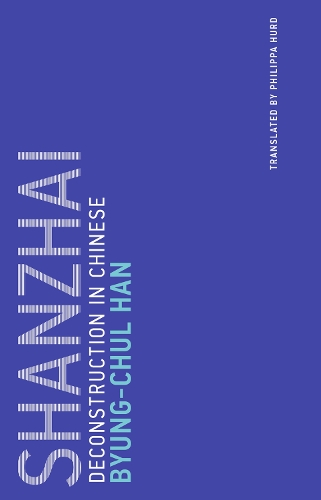
Shanzhai: Deconstruction in Chinese: Volume 8
(Paperback)
Publishing Details
Shanzhai: Deconstruction in Chinese: Volume 8
By (Author) Byung-Chul Han
Translated by Philippa Hurd
MIT Press Ltd
MIT Press
6th October 2017
6th October 2017
United States
Classifications
General
Non Fiction
Theory of art
306.4
Physical Properties
Paperback
104
Width 114mm, Height 178mm, Spine 6mm
Description
Tracing the thread of "decreation" in Chinese thought, from constantly changing classical masterpieces to fake cell phones that are better than the original.Shanzhai is a Chinese neologism that means "fake," originally coined to describe knock-off cell phones marketed under such names as Nokir and Samsing. These cell phones were not crude forgeries but multifunctional, stylish, and as good as or better than the originals. Shanzhai has since spread into other parts of Chinese life, with shanzhai books, shanzhai politicians, shanzhai stars. There is a shanzhai Harry Potter- Harry Potter and the Porcelain Doll, in which Harry takes on his nemesis Yandomort. In the West, this would be seen as piracy, or even desecration, but in Chinese culture, originals are continually transformed-deconstructed. In this volume in the Untimely Meditations series, Byung-Chul Han traces the thread of deconstruction, or "decreation," in Chinese thought, from ancient masterpieces that invite inscription and transcription to Maoism-"a kind a shanzhai Marxism," Han writes. Han discusses the Chinese concepts of quan, or law, which literally means the weight that slides back and forth on a scale, radically different from Western notions of absoluteness; zhen ji, or original, determined not by an act of creation but by unending process; xian zhan, or seals of leisure, affixed by collectors and part of the picture's composition; fuzhi, or copy, a replica of equal value to the original; and shanzhai. The Far East, Han writes, is not familiar with such "pre-deconstructive" factors as original or identity. Far Eastern thought begins with deconstruction.
Author Bio
Byung-Chul Han, born in Seoul, is Professor of Philosophy and Cultural Studies at the Universit t der K nste Berlin (UdK). One of the most widely read philosophers in Europe, he is the author of more than twenty books, including including four previous volumes in the MIT Press Untimely Meditations series, In the Swarm- Digital Prospects, The Agony of Eros, Shanzhai- Deconstruction in Chinese, and Topology of Violence.
